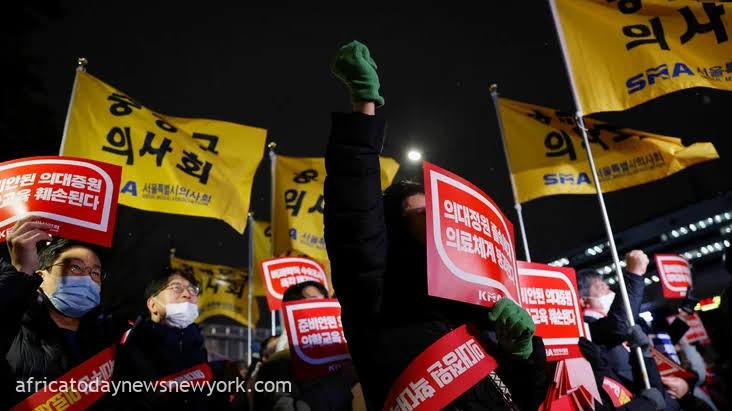Following a widespread protest by medical trainees, South Korea escalated its health alert to its most severe level on Friday.
Concurrently, the prime minister announced plans for public hospitals to extend operational hours, addressing mounting pressures on the healthcare system.
Nearly 66% of the nation’s youthful physicians have staged a walkout in objection to the government’s proposal to increase medical school admissions. This action has compelled hospitals to reject patients and postpone procedures, sparking concerns of prolonged disruption to the healthcare system if the conflict persists.
“The operation of public medical institutions will be raised to the maximum level,” Prime Minister Han Duck-soo said at the opening of a disaster management meeting.
Their impact is particularly felt in emergency departments, intensive care units, and surgical theaters within prominent hospitals, which receive patients referred by secondary healthcare facilities and private clinics. The heavy reliance on trainee doctors in larger hospitals is partly driven by cost factors.
Responding to the growing strain on hospitals, the government made the decision to raise its health alert level from “cautious” to “severe” as of Friday.
Read also: Operations Halted As South Korea Doctors’ Strike Continues
Since the onset of trainee doctors resigning in protest against the government’s plan, emergency departments in South Korea’s major hospitals have been under immense pressure.
Participating doctors in the protest assert that the primary concern revolves around remuneration and working conditions, rather than the quantity of physicians.
Although senior doctors and members of the Korean Medical Association, which serves as a voice for physicians in private practice, have not joined the trainee doctors in their walkout, they have orchestrated rallies demanding the government to retract its plan. A large-scale demonstration is forecasted to take place in Seoul on Sunday.
The prime minister reiterated his plea to young doctors, urging them not to make choices that could mar the sacrifice and commitment they exhibited during the Covid-19 pandemic, which garnered them public admiration.
He also urged the medical community to refrain from “pushing young doctors” and reiterated the government’s commitment to open dialogue.
A recent Gallup Korea poll revealed that approximately 76% of respondents, regardless of political affiliation, support the government’s proposal to boost medical school admissions, indicating widespread backing among Koreans.

